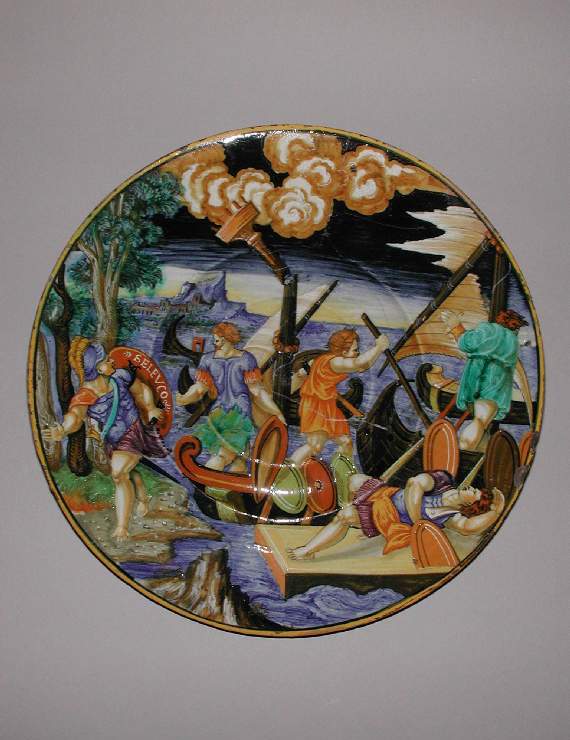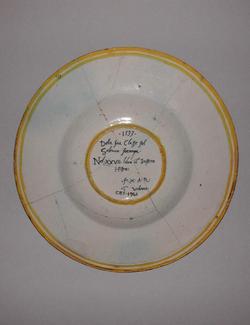Current Location: In storage
Titles
Seleucus II escaping from his Fleet after it had been wrecked by a Storm
Maker(s)
Painter:
Avelli, Francesco Xanto
Printmaker:
Monogrammist I. B.
(After)
Printmaker:
Dente, Marco (Marco da Ravenna)
(After)
Printmaker:
Raimondi, Marcantonio
(After)
Entities
Categories
Description
Maiolica plate. Painted in polychrome with Seleucus II escaping from his Fleet after it had been wrecked by a Storm.
Pale buff earthenware, tin-glazed overall; the glaze on the reverse is thin, off-white, and tinged with green. Painted in blue, turquoise-green, yellow, orange, stone, brown, manganese-purple, inky blue-black, black, and white.
Shape 56 but shallower. Circular with a sloping rim and broad, shallow well.
Seleucus II escaping from his Fleet after it had been wrecked by a Storm. On the left, Seleucus, bearing a shield inscribed 'SELEVCO', flees from the shore. In the middle, a man holding an oar and a warrior with a shield stand on a ship with a broken mast. On the right, a man with his back to the viewer stands on a ship, and another lies on the jetty. In the background there are three more ships with storm clouds above. The back is inscribed in the middle in dark blue: '.1533./Della sua Classe sol/Seleuco scampa./Nel .XXVII. libro d Iustino/ Histo:/.f.X.A.R./i Urbino.' (From his fleet only Seleucus escapes.In the 27th book of Justin's History:.Francesco Xanto Avelli da Rovigo in Urbino.). The base is encircled by one yellow band and the rim by two.
Notes
History note: Lieut-Col. Auberon Claud Kennard (1870-1951), London; Sotheby's, 25 June 1931, Catalogue of two pieces of Henri II ware, fine Italian maiolica, Rhodian and other faience from a few well-known private collections comprising . . . the property of Lieut-Col. Auberon Kennard, 29 Sloane Gardens, S.W. 3., lot 8; Louis C.G. Clarke, LL.D. (1881-1960), Leckhampton, Cambridge
Legal notes
L.C.G. Clarke Bequest, 1960
Measurements and weight
Diameter: 28.6 cm
Height: 2.9 cm
Acquisition and important dates
Method of acquisition: Bequeathed
(1961-04-27)
by
Clarke, Louis Colville Gray
Dating
16th Century, second quarter
Renaissance
Production date:
AD 1533
: dated
Note
The subject of the decoration was taken from Marcus Junianus Justinus' Latin epitome of Pompeius Trogus' Historiae Philippicae. In 246 BC, Seleucus II (265-226 BC) inherited the empire created by his father, Seleucus I, King of Syria. His tyrannical murder of his stepmother, Berenice, and his young brother provoked several cities to revolt against him. Seleucus raised a fleet to defeat them, but it was wrecked by a storm, and only he and a few of his supporters escaped.
The inscription on the back is signed with the initials of Francesco Xanto Avelli da Rovigo, a freelance maiolica painter in Urbino, who is not known to have owned his own pottery. One of the most characteristic features of his work was the creating of scenes form classical history or mythology by copying and adapting figures from different printed sources. He constructed this scene with figures from three engraved sources. Seleucus was based on a warrior on the left of 'Battle with a Cutlass', by Marco Dente (?) after Raphael or Giulio Romano or perhaps, as the figure is reversed, on the reversed version by Agostino Veneziano. The prone man on the jetty was derived from a figure in the right foreground of the same print. The figure to left of centre was derived from 'Sol' from the 'Gods who preside over the Seven Planets' by the Monogrammist IB, and the man on the right from the 'Martyrdom of St Lawrence' by Marcantonio Raimondi after Baccio Bandinelli.
School or Style
Renaissance
People, subjects and objects depicted
Components of the work
Decoration
composed of
high-temperature colours
( blue, turquoise-green, yellow, orange, stone, brown, manganese-purple, inky blue-black, black, and white.)
Materials used in production
Tin-glaze
Earthenware
Techniques used in production
Moulding
: Pale buff earthenware, tin-glazed overall; the glaze on the reverse is thin, off-white, and tinged with green. Painted in blue, turquoise-green, yellow, orange, stone, brown, manganese-purple, inky blue-black, black, and white.
Tin-glazing
Inscription or legends present
- Text: .1533./Della sua Classe sol/Seleuco scampa./Nel .XXVII. libro d Iustino/ Histo:/.f.X.A.R./i Urbino.
- Location: Reverse, in the middle
- Method of creation: Painted in dark blue
- Type: Inscription
References and bibliographic entries
Related exhibitions
Identification numbers
Accession number: C.87-1961
Primary reference Number: 76261
Stable URI
Audit data
Created: Saturday 6 August 2011
Updated: Tuesday 30 April 2024
Last processed: Wednesday 14 May 2025
Associated departments & institutions
Owner or interested party:
The Fitzwilliam Museum
Associated department:
Applied Arts





